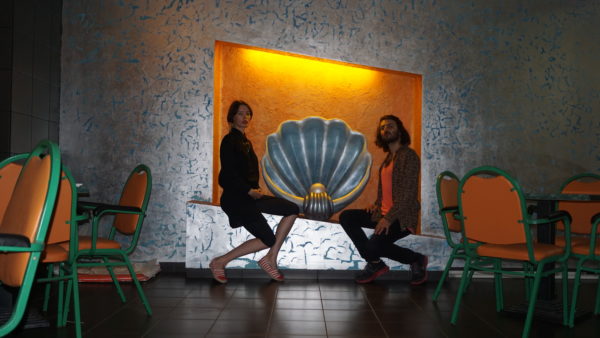During the late ‘80s and early ‘90s, a parallel pseudo wedding industry developed in Romania. Hundreds of bands emerged all over the country and the predilect sound of family events either at restaurants or at home was what is today referred to as “proto-Manele”. A mix of electrified oriental pop with local flavour, “proto-Manele” crystallised into today’s “Manele” contemporary wedding music. Raze de Soare – Albatros is a tribute EP to one of the most famous local “proto-Manele” bands, the eponymous Albatros. Here, 1/2 of Raze de Soare, Ion Dumitrescu, tells us more. Raze de Soare were nominated for SHAPE by Rokolectiv Festival.
Can you talk about the context behind Raze de Soare as well as the environment/surrounding it grew from? Is it more a tribute, irony or postmodern recontextualisation?
In the past five years, Future Nuggets has released several projects that fuse the local with the oriental. Albatros, though, are hard to integrate into Manele per se; they had a distinct sound, coming from a subculture fermented in the socialist ghetto, not around weddings and old-school lăutari [traditional musicians]. Unconsciously, the environment had already been constructed for Raze de Soare at Future Nuggets, thus the conditions were favourable. Cosima O [Opartan, the second half of Raze de Soare] was a big fan of Albatros’ early period – vol. 1 and 2 being on heavy rotation. At first, Raze de Soare was just an intention to play around with an Albatros themed song that had been haunting me. I had no plan to release though. The simple melody of Vis Împlinit functioned like an ancestral virus, there is no antibody to it, it instantly stuck and the contamination began. This is Marian Lapadat’s (main composer of Albatros’ tracks) legacy. It doesn’t matter how “original” his proto-writing was; it doesn’t matter where he drew inspiration from. There is an “elementarity” to it, it has the effect of a classic. Then Cosima came and recorded just the chorus. She had never sung before, yet her voice was a natural match to the track. We decided to make three more reworks and present them as a concept-tribute EP. So I guess you have all the variations of what you enumerated in your question – each of them is true. But at first, there was our genuine love for the music (the tribute), then the actual post-modern move (re-working, re-context), then the future – spreading the Albatros infection deep into the international realm.
What was the motivation behind recontextualising the band Albatros and Manele, per se? Was it more artistic or activist?
I define these two options in other terms: Transgression through love (affect) or transgression through ideology (reason). They both work somehow, yet if you want to transgress your own culture and venture into worlds that are not your class and cultural environment you have to connect at an affective level. Usually – common knowledge says – music is a good medium, a good bridge through which to access other cultures, but in the case of Manele, I don’t think it has worked. A whole segment of society in Romania, (right-wing) intellectuals included, recoils at the first note of Manele. As soon as the orientally modulated Gypsy voice pours from speakers, they run away. The ideological racism prevents them from opening their ears. Their mental ecology doesn’t allow the oriental groove to take over their body.
Over time, Future Nuggets has tried different ways of bridging different worlds. One of the political perils that one has to take heed of, is that as you “re-work”, in terms of sound, textures and overall atmosphere, it can also function as a sort of cultural translation. Trying to translate Manele to middle class Western-oriented listeners, to “psychedelise” what is already quite trancy, but not understood culturally as such in their (our) sphere. And at some point one can notice that urban, informed, middle and upper-middle class people would love Steaua de Mare or Raze de Soare, but they won’t go to a Manele club even if it were the last nightclub in town. So how does transgression work? How far can we transgress our own Umwelt? One can immerse him/herself, but one can truly stay immersed only when affective contamination is involved.
Can you talk about Future Nuggets, the label you run and release Raze de Soare records on?
Future Nuggets is in a perpetual, yet consistent drift. I’m really excited about Plevna, which is finally out, the first 10″ from a Romanian label since 1973. It took 6 months from to go from “pre-order” status to “in stock”. But what does time mean in the outernational realm? “Losership” principles demand to let go of keeping up, to give up regularity. It took Horatiu Serbanescu 2 years of southeast sonic alchemy to produce this untraceable sound. Soon, a record by Renato din Sălaj will be out. Renato also needs to be put into context. His collaboration with Future Nuggets was possible thanks to a music project involving state prisons. The project was coordinated by Andrei Dinescu, Horatiu Ș, myself and a few others that took part. It was called Shamanelism (it happened somewhere in 2013). But uncertainty looms. First we wanted to put forward the music (the affect), then we will add the hardcore social context and the politics that need to be addressed.
Can you describe your live sets?
It depends on the project. I’ve been part of several live arrangements and they were different each time. Raze de Soare has a minimal setup, in the tradition of Albatros – three people, one on keyboard, one voice, one guitar. It relies on the performative side, on representation, on queen Cosima’s magical presence and eerie voice.
Interview by Lucia Udvardyova
